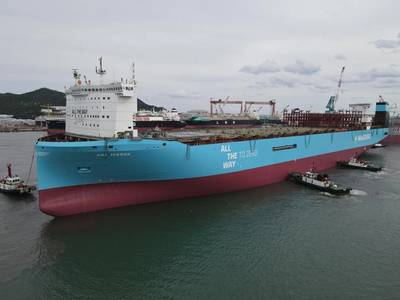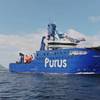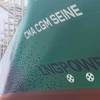Maersk Names First Large Methanol-Enabled Vessel
The world’s first large methanol-enabled container ship has been named Ane Mærsk at a ceremony in the shipyard of HD Hyundai Heavy Industries in Ulsan, South Korea.
The 16,000 TEU vessel is named after Ane Mærsk Mc-Kinney Uggla, the Chair of the A.P. Moller Foundation and A.P. Moller Holding. Ane’s eldest granddaughter served as godmother, and christened the vessel by breaking a champagne bottle over the bow.
Ane Mærsk is the first of Maersk’s 18 large methanol-enabled vessels that will be delivered between 2024 and 2025. It is the world’s second methanol-enabled container vessel, as it follows the 2,100 TEU feeder Laura Maersk. It will enter service on the AE7 string connecting Asia and Europe in February, marking a significant milestone in the company’s commitment to pioneering low-emissions shipping solutions.
The vessels in the new series have an industry-first innovative design with the bridge and accommodation placed at the very front of the vessel, which Maersk says ensures fuel efficient operations.
“This series of vessels will have a transformative impact on our ambition to progress on our industry-leading climate ambitions. It is a visual and operational proof of our commitment to a more sustainable industry. With Ane Mærsk and her sister vessels we are expanding our offer to the growing number of businesses aiming to reduce emissions from their supply chains,” says Vincent Clerc, Chief Executive Officer of A.P. Moller-Maersk.
Ane Mærsk will begin her maiden voyage on green methanol. Maersk defines “green fuels” as fuels with low to very low GHG emissions over their life cycle compared to fossil fuels. Different green fuels achieve different life cycle reductions depending on their production pathway. By 'low' the company refers to fuels with 65-80% life cycle GHG reductions compared to fossil fuels. This covers, e.g., some biodiesels. “Very low” refers to fuels with 80-95% life cycle GHG reductions compared to fossil fuels.
Maersk has set a net-zero greenhouse gas emissions target for 2040 across the entire business and has also set tangible and ambitious near-term targets for 2030 to ensure significant progress. Maersk continues to source methanol and bunkering solutions for its methanol-enabled vessel fleet.














